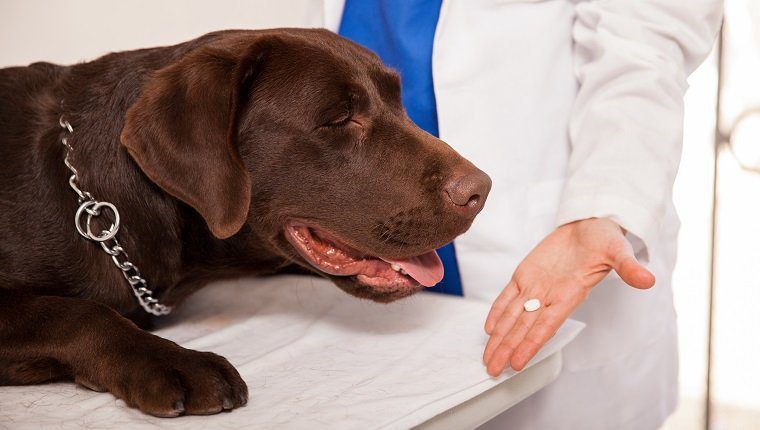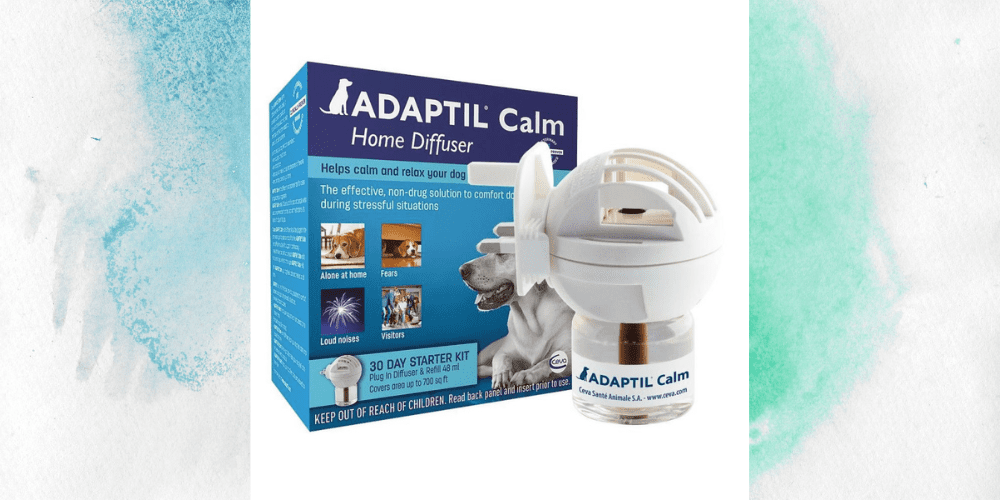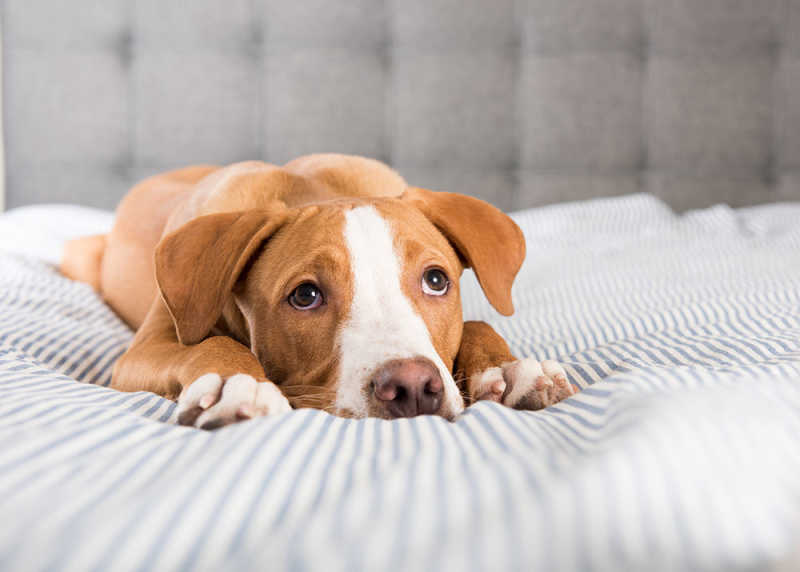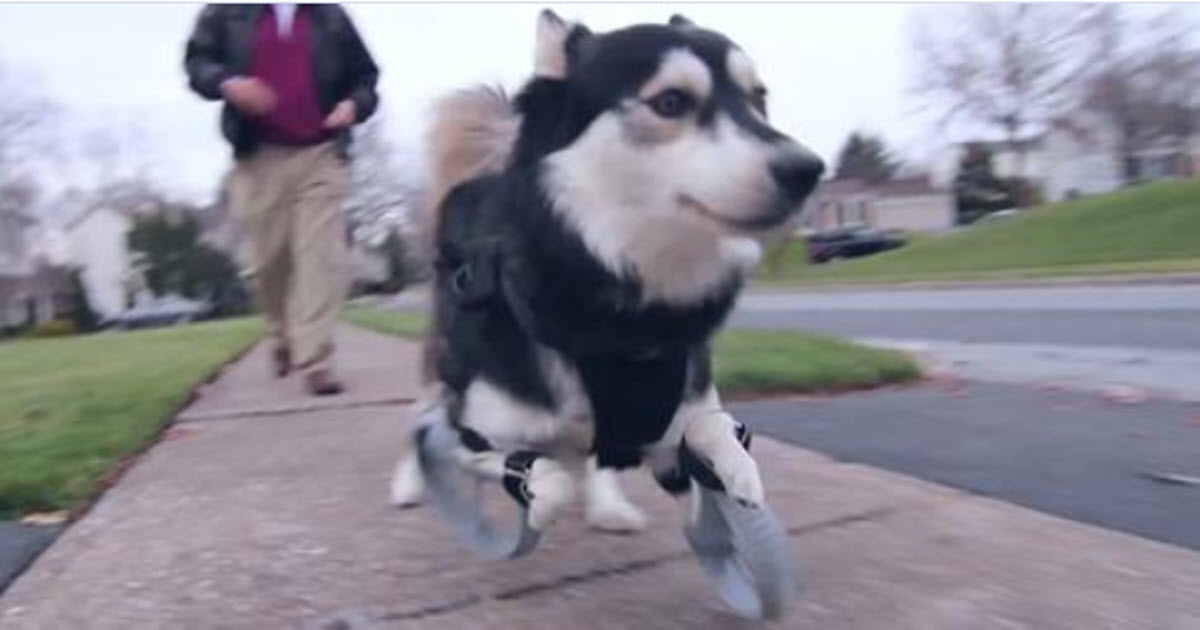Many dog owners are desperate to find ways to help their pets sleep through the night, and with good reason! Not only can constant barking and howling keep you up, but it can also be very stressful for your dog. Unfortunately, many of the medications used to treat insomnia in humans are not safe for dogs, making natural remedies your best bet for helping your dog sleep peacefully through the night.
After playing in the yard the day, your dog probably doesn’t want to go to sleep. Unfortunately, all that exercise can be exhausting, and you’ll probably have better luck getting your dog to rest if he’s had some time to calm down before bedtime. Fortunately, several home remedies can help settle an overexcited dog and allow him to enjoy a good night’s sleep.
Pet owners can do several things at home to ensure their pup has the rest he needs, even if it isn’t eight hours of sleep at once. Try these simple home remedies tonight and see if your dog sleeps like a baby. Here are eight home remedies to help your dog sleep through the night.
What Can I Give My Dog To Sleep At Night
1) Valerian root
Valerian root is a popular herbal remedy for insomnia and anxiety and one that many pet owners choose when looking for a natural sleep aid. It’s thought to work by increasing levels of a chemical called gamma-aminobutyric acid (GABA) in the brain. This chemical helps regulate nerve cells and has a calming effect on anxiety. A few small studies have found valerian root may help people fall asleep faster and sleep more soundly. But not all research has shown it to be effective, so talk with your vet before trying it. You can give your dog up to 1,600 milligrams daily as a supplement or brew tea from the dried roots.
2) Melatonin
Melatonin is a hormone that helps regulate sleep. You can give your dog melatonin to help them sleep through the night. The recommended dosage is 1-3mg per 20lbs of body weight. Melatonin can be given orally or topically. However, if you give it orally, do not exceed 5mg daily as this may cause increased drowsiness. As with all sleep aids, it’s best to talk with your vet before giving this supplement for the first time, as too much melatonin may cause seizures in some dogs.
3) Magnesium supplements
One home remedy that can help your dog sleep through the night is magnesium supplements. Magnesium is a natural muscle relaxer, so it can help ease your dog’s anxiety and allow them to get a good night’s rest. If you’re interested in trying this method, speak with your veterinarian to ensure it’s right for your dog. The supplement’s dosage will depend on your pet’s size, but many veterinarians recommend around 100mg of magnesium citrate per 10 pounds of body weight. Dog owners praise this remedy for helping their dogs sleep comfortably through the night.
4) Chamomile tea
Chamomile tea is a popular herbal tea made from the chamomile plant. Chamomile tea has a calming effect and can help promote sleep. Add one teaspoon of dried chamomile flowers to one cup of boiling water to make chamomile tea for your dog. Steep for five minutes, then strain and let cool. Give your dog one tablespoon of tea per 20 pounds of body weight as part of their bedtime routine. If you have a smaller dog or cat, give 1/2 teaspoon of tea per 5 pounds before bedtime. The smell may not be delightful, but it will help your pet relax and fall asleep faster. This may also help calm anxious dogs stop their unusual behaviors.
5) B Vitamins
Is your dog experiencing sleepless nights? B vitamins are essential for many bodily functions, including helping to regulate the nervous system. A B vitamin deficiency can lead to anxiety and restlessness, which can keep your dog from sleeping through the night. Adding a B vitamin supplement to your dog’s diet may help promote better sleep. Other natural remedies for restless dogs include adding chamomile tea or herbs like valerian root or hops to their water dish. Be sure not to give them too much as these herbs can be toxic if consumed in large quantities. Contact your vet immediately if you notice any adverse side effects.
6) Treats
Give your dog a small amount of honey before bed. Mix a teaspoon of honey with their food or water bowl. The small amount of sugar will help them sleep through the night. If you have lavender oil, add a few drops to your dog’s bed or rub it on their fur. Lavender oil has been known to help dogs fall asleep. It’s an alternative to using medication like Valium, which is not safe for animals. The smell of lavender around your dog’s sleeping area just might have a bigger effect than you could have hoped. It is often used during crate training to help encourage dogs to favor their designated space rather than despise it.
7) Pheromones (skin patches or diffusers for your dog’s bedding, etc.)
Pheromones are a natural way to help your dog feel calm and relaxed. They’re also safe and non-toxic, making them an excellent option for dogs with anxiety or who tend to be stressed out. You can find pheromone products at most pet stores or online. Put one on your dog’s bedding (or where they typically sleep) before you go to bed. The scent will dissipate through the night, so it doesn’t linger in their nose all day long. This is often preferred by dog owners who like to keep things natural; it is a beautiful alternative to prescription medications.
8) DAP plug-in diffuser
Want your pup to get their beauty sleep but instead find them being restless all night long? If your dog finds sleeping hard at night, you can do a few things to help him or her out. One is to get a DAP plug-in diffuser and fill it with a calming pet product like lavender. Research has shown that these products can help pets relax and fall asleep easier.
DAP is available online, but in most cases, it will be best if you find this locally from a pet store. You may also want to talk to your vet about any other health issues they might have been having. You should also ensure that their bedroom is as dark as possible and keep noise levels down since some animals prefer quieter environments for sleeping than others.
9) CBD Oil
CBD Oil is a natural, non-toxic way to help your pet relax and get a good night’s sleep. CBD oil works by interacting with the body’s endocannabinoid system, which helps to regulate mood, pain, and anxiety. Giving your pet a small dose of CBD oil before bedtime can help them relax and get a whole night’s rest. It won’t make your dog high, as it does not contain THC.
And because CBD oil is non-addictive and has no known side effects, it’s safe to use on a nightly basis. So if you’re looking for a natural way to help your pet sleep through the night, give CBD oil a try. It can also help appease many other medical conditions without needing to put your dog on prescription medication. Many dog owners prefer it right up there with an herbal supplement when looking for a more natural sleep aid.
Reasons Your Dog Might Not Be Sleeping
It’s no secret that a good night’s sleep is essential for physical and mental health. But what about our furry friends? Like us, dogs need quality sleep to stay healthy and Happy. However, several reasons your dog might not be sleeping through the night. Various factors can affect your dog’s sleep schedule, from very young puppies to older dogs.
Anxiety, pain, age, illness, and restlessness are all common factors that can keep dogs from sleeping through the night. Environmental factors, noise levels, and pheromones can also affect your dog’s sleep habits.
If you’re concerned about your dog’s sleep habits, here are a few things that may disrupt their sleep routine.
1. Anxiety
Separation anxiety: This is one of the dogs’ most common types of stress. It occurs when a dog is separated from their owner or something they’re familiar with. Dogs with separation anxiety may pace, bark, whine, or become destructive when left alone.
Tips to combat separation anxiety:
- Try to leave your dog with something familiar, like a toy or blanket that has your scent on it.
- Ensure you give your dog enough exercise before bedtime, so they’re tired. You may need to increase the daily walk to 2 or 3 times a day to ensure you’re appropriately expending a dog’s excess energy. Hire a dog walker if you find your schedule doesn’t allow the time to make this happen each day.
- Start by leaving them for short periods and gradually increase the length of time you’re gone.
2. Pain
If your dog is having trouble sleeping, it could be a sign of pain. Most dogs are notoriously good at hiding their pain, so it can be tricky to know if that’s the reason for their sleeplessness. Here are a few things to look for:
First, take note of how your dog is acting during the day. If they seem unusually tired or lethargic, it could be a sign that they’re in pain. They may also be less interested in playing or going for walks. Secondly, observe your dog’s behavior at night. If they pace or cry out in their sleep, they may be experiencing discomfort.
Try to give your dog medication that contains non-steroidal anti-inflammatories; steroids tend to create a jittery effect, so they might be causing your dog to stay awake when you need them to fall asleep.
Finally, consult with your veterinarian. They can help to rule out other potential causes of sleeplessness and determine whether or not pain is the likely culprit. If your dog is in pain, options are available to help them get relief and finally get some restful sleep.
3. Age
Dogs experience a decline in physical function as they age, just like humans. This can make it harder for them to get comfortable and fall asleep. Senior dogs may also suffer from conditions like arthritis or cognitive decline, which can further disrupt their sleep.
Arthritis
Several treatment options are available for your older dog with arthritis, and catching it early can help make the condition more manageable. If you think your dog might have arthritis, there are a few things you can look for. Limping or favoritism of one leg over another, difficulty getting up from a lying or sitting position, reduced activity level, reluctance to jump or climb stairs, and decreased interest in playing are all potential signs. If you notice any of these changes in your dog’s behavior, you must take them to the vet for an evaluation.
Cognitive Decline
Just like people, dogs can experience canine cognitive dysfunction as they age. This can manifest in several ways, including changes in sleeping habits, decreased interest in toys or playing, and increased anxiety. However, a decrease in housetraining is one of the dogs’ most common signs of cognitive decline.
If your normally well-behaved dog suddenly starts having accidents in the house, it may indicate something is wrong. Make sure you give them bathroom breaks as close to bedtime as possible – but they may also need a potty break overnight to be more comfortable.
If you notice any changes in your dog’s behavior, it’s important to take them to the vet for a checkup. With early diagnosis and treatment, many dogs with cognitive decline can live happy and healthy lives.
4. Illness
Dogs are masters of disguise when it comes to hiding illness. After all, in the wild, a sick or injured animal is an easy target for predators. Fortunately, some telltale signs can help you to spot when your furry friend is not feeling well. One of the most common indicators is a change in energy levels. If your dog is normally lively and playful but suddenly becomes sluggish and disinterested in activities, it could be a sign that something is wrong.
Another clue is a change in appetite. A sick dog or one with a regularly upset stomach may lose its appetite or become fussy about food. You may also notice changes in bathroom habits, such as increased urination or diarrhea. Of course, these signs can also indicate other issues, so it’s essential to consult with your veterinarian if you have any concerns about your dog’s health. By being aware of the subtle clues that your dog may be sick, you can help ensure that they receive the care they need to return to their usual, happy selves.
5. Restlessness
There are several potential causes of restlessness in dogs. Anxiety is a common one, as dogs can become stressed by changes in their routine. If your dog is restless, it’s essential to consult with your veterinarian to rule out any potential medical causes. Once a medical reason has been ruled out, you can do several things to help your anxious dog relax and get a good night’s sleep.
And the solutions don’t always involve sleep aids; sometimes, something as simple as calming music can put your dog to sleep comfortably for the night. Classical music has a very soothing effect on dogs and may help them sleep at night.
6. Environmental factors
If your dog has difficulty sleeping, it could be due to environmental factors. Dogs are susceptible to changes in their environment, and even minor disruptions can cause sleep cycle disorders in adolescent dogs. If a recent change in your home, such as a new baby or pet, could be the culprit. Or, if there’s been construction or other noisy activity going on near your home, that could disrupt your dog’s sleep patterns.
To help your dog adjust to changes in his environment, try to create a consistent routine. Set regular mealtimes and walks, and establish a quiet place for him to sleep where he feels safe and secure. Crate training, though typically used when owners are away from the house, can often be very successful when applied to dog bedtime. It can be a positive addition to your dog’s sleeping habits, giving them a space that is theirs. You’d be surprised how much this can improve their sleep schedule. With patience and effort, any dog owner can help their dog get the rest he needs, often without requiring a sleep aid or other medications.
7. Noise levels
If your dog has difficulty sleeping at night, it could be due to noise pollution. Dogs are much more sensitive to sound than humans, and even seemingly small noises can disrupt sleep. Familiar sources of noise pollution include traffic, construction, and loud music.
If your dog is having trouble sleeping, try to minimize noise exposure as much as possible. This may mean keeping them in a quiet room away from windows or using a white noise machine to help them relax. With a little bit of effort, you can help your dog to sleep.
8. Urinate (They Have To Pee)
If your dog has difficulty sleeping, it may be because they have to pee. When a dog’s body tries to relax and sleep, its brain signals to its bladder that it is time to empty. However, if the dog is already holding a full bladder, it may not be able to relax and fall asleep entirely. This can lead to restless nights for both you and your furry friend.
You can do a few things to help your dog sleep through the night. First, ensure they empty their bladder before bedtime; take a potty break as close to rest as possible. You can also try training them to hold it longer by gradually extending the time between walks. Finally, if your dog is still having trouble sleeping, talk to your vet about possible medications that can help. You and your dog can enjoy peaceful nights of restful sleep with patience and effort.
8. Body temperature
Similar to how you probably can’t sleep if your environment is too hot or too cold, the same can be said for your pet. If you want your dog to sleep, make sure their area is at a comfortable temperature with breathable and soft bedding. Dogs sleep better when not crammed between people elevating their body temperature.
So as much as you want to snuggle your dog, it could be keeping them up at night. And if your dog doesn’t sleep at night, you’re unlikely to either. Both dog owners and dogs alike need a consistent sleep schedule, so ensure the temperature is right for your furry friend.
Conclusions
If your dog is having trouble sleeping, there are several things you can do to help. First, consult with your veterinarian to rule out any potential medical causes. Once you’ve ruled out a medical reason, several home remedies can help, including establishing a routine, minimizing noise exposure, and creating a cozy space for them with a soft bed and calming toys. You can help your dog get the peaceful sleep they deserve with patience and effort.
FAQs (Frequently Asked Questions)
Q: Why does my dog can’t sleep at night?
A: Dogs rarely suffer from insomnia, and when they do, it usually points to a more serious underlying health issue. It can be brought on by concerns with one’s physical health, such as those that are painful (like arthritis or an injury), itchy (like fleas), or lead to frequent urination (like kidney disease or diabetes). Insomnia can be caused by several factors, including anxiety, stress, and excess energy.
Q: Can I give my dog Benadryl to sleep at night?
A: Benadryl’s sedative effects make it a viable option for treating anxiety. Some dog owners give it to their canine companions before exposure to potentially anxiety-provoking events like fireworks or storms. Benadryl’s soothing properties make it helpful in treating insomnia.
Q: How do you calm a restless dog at night?
A: If your dog becomes anxious and energetic when the sun goes down, take the following steps to calm him down:
- Give him something soothing to eat.
- Provide a safe and comfortable sleeping environment.
- Locate his favorite cuddly toy.
- Use soothing scents.
- Relax him by spending time together.
Q: Will melatonin hurt a dog?
A: As reported by the American Society for the Prevention of Cruelty to Animals (ASPCA), melatonin is a healthy vitamin for dogs.
Q: Is 10mg of melatonin too much for a dog?
A: The following is a guideline for administering melatonin to canines (up to three times daily): Dogs under 10 pounds need only 1 mg. The dosage for dogs between 10 and 25 lbs. is 1.5 mg. If your dog weighs between 26 and 100 pounds, give him 3 milligrams.
Q: Can you give a dog melatonin every day?
A: You should never give melatonin to your dog more than three times per day, regardless of the dose size.


























